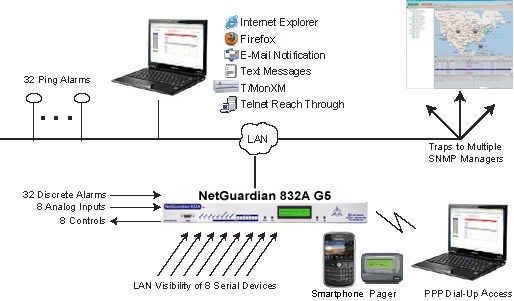Check out our White Paper Series!
A complete library of helpful advice and survival guides for every aspect of system monitoring and control.
1-800-693-0351
Have a specific question? Ask our team of expert engineers and get a specific answer!
Sign up for the next DPS Factory Training!

Whether you're new to our equipment or you've used it for years, DPS factory training is the best way to get more from your monitoring.
Reserve Your Seat Today"Telemetry" is a word with many meanings in many different industries. The term simply refers to "metrics" across long distances ("tele"), so telemetry systems can be useful in many different contexts. In fact, using telemetry to monitor system performance can be critical in these fields.
If you monitor a telephone or computer network, or perhaps a broadcast system, your ability to transmit data is your entire business.
The transmission of data from you to your customers (or among your customers themselves) is absolutely essential. To that end, you have to be able to monitor and correct problems that crop up. Many systems are remotely monitored to ensure uninterrupted performance.
Consider the physical structure of a telecom network. There are many nodes, antenna towers, and other remote facilities. You could have hundreds or even thousands of remote sources of data to manage. Each one has a potential story to tell. Understanding user behavior across these nodes can also optimize operational efficiency.

It's telemetry data that gives you important insights into the physics of your business:
These issues are often discovered when using telemetry to monitor critical site parameters. When you collect this kind of data, it can appear on your central monitoring station so you understand the "big picture" at all times.
Just like when monitoring in medical or weather contexts (more on that later), you need remote devices to provide remote sensing and send data back to you.
In a telecom context, this most commonly takes the form of an RTU (a Remote Terminal Unit or Remote Telemetry Unit). This is a device that you'll install at your remote facility, whether it's a cell tower, broadcast tower, train station, or anything else.
Your RTU is your window to all remote sites from your desk. If you only have a few sites, it will send messages directly to you via SMS or email. Having the ability to monitor these sites remotely ensures that urgent problems can be addressed promptly.
If you have many sites, you'll need some kind of central alarm collector. That central collector must (obviously) be compatible with all of your remote devices. Focus on communication standards like SNMP to make things easier.
These tools exist in a variety of price ranges. You can figure out ways to do this with a $20 Arduino or a $40 Raspberry Pi computer. There are RTUs in the $1000-$5000 range that are telco-grade and intended for harsh remote-site environments.
What you need to do is balance your budget dollars against the importance of your enterprise. Fortunately, monitoring is a relatively tiny percentage of most organizational budgets, so there's little need to "cheap out" on these purchases.
If you have a significant operation, like a telco, a power utility, a rail network, police/fire radio, 911 dispatch, etc., you can easily justify the quality telemetry equipment you need to buy.
On a much smaller geographic scale, but one of the utmost importance, is what's known as "nurse telemetry" in a medical context.
This is a bit of a non-standard name, since we're not actually monitoring nurses here. Instead, we want nurses to be able to track patient health status at all times to speed responses to any problems or emergencies. Using telemetry to monitor user behavior in a hospital setting enhances patient care and operational efficiency.
Most people will be familiar with nurse telemetry, even if you've never heard the name before. You may have either experienced or seen in a movie where an EKG (heart monitor) goes flatline. Suddenly, a team of nurses and doctors rush in to attempt resuscitation. That's thanks to a telemetry system that forwarded an alert to a central monitoring panel.
Somewhere on that hospital wing, a console started flashing and beeping. That allowed a worker who was not in the room to know that there was a problem.
If you're a meteorologist, your ability to forecast depends on data you receive from distant sources. It's not enough to look out your front door. You need to know about storms that are forming 1000 miles away. Telemetry systems transmitting meteorological data from remote sensors make this possible.
To this end, we deploy weather balloons with automatic measurement systems to collect meteorological data. All of that data gets sent back via radio transmitters to provide real-time insights into evolving weather patterns. These tools support transmitting meteorological data in hybrid setups.
Doppler radar provides similar types of data over a wide area. Weather stations, each monitoring their local area, create an overall telemetry network.
Even wild animals, closely tied to weather throughout the year, are an interesting data source for climate scientists.
Writing articles like this one, I attract quite a few inbound phone calls. Many different people in many different situations have called to speak with me about telemetry topics. These include professionals looking to implement systems that are remotely monitored for efficiency and security.
One thing that varies is the "hobbyist vs. professional" spectrum. If you're a hobbyist playing around with the technology, that's great. In fact, many of our telemetry engineers at DPS got started with hobby projects. It is almost always more valuable to learn this way compared with traditional textbook lectures.
If you're already a working professional, it's important that you respect the value of your telemetry network. Poor remote-site visibility gets expensive quickly. Your routine work is more expensive when you waste hours driving around blindly between sites. Your expensive (and tragic) disasters and emergencies get more frequent when you don't have good situational awareness.
If you're a professional, be sure you properly respect that value. Don't skimp on telemetry purchasing. Save money where you can, but only if you can do it without sacrificing quality, reliability, and ease of installation.
Telemetry is a varied and complex topic. There are many different things you could be trying to do with it.
Whether you're a professional or a hobbyist, you have questions that must be answered.
If you're a professional working with telecom telemetry, you have absolutely come to the right place. That is our core business at DPS. (If you're working on something else, I'll still happily answer a few questions if you give us a call.)
To review the fundamentals and/or discuss your buying options, just give me a call at 1-800-693-0351 or email sales@dpstele.com
All DPS Telecom products include comprehensive technical support. If you've purchased one of our products and are encountering any kind of issue, contact DPS Tech Support today at 559-454-1600.
At DPS Telecom, the representative who answers your call isn't an intern reading from a script. DPS Tech Support representatives are engineers who contribute to product development. And, if your problem requires additional expertise, the DPS Engineering Department that designed your product is right down the hall.
Help us connect you to the right engineer by filling out this quick questionnaire. Simply leave your contact information to get started, and we'll call you back. Most preliminary discussions are about 15 minutes, and afterward, we'll send you a custom application diagram of a recommended solution that'll make it easier to justify your project to management.

Andrew Erickson
Andrew Erickson is an Application Engineer at DPS Telecom, a manufacturer of semi-custom remote alarm monitoring systems based in Fresno, California. Andrew brings more than 19 years of experience building site monitoring solutions, developing intuitive user interfaces and documentation, and opt...